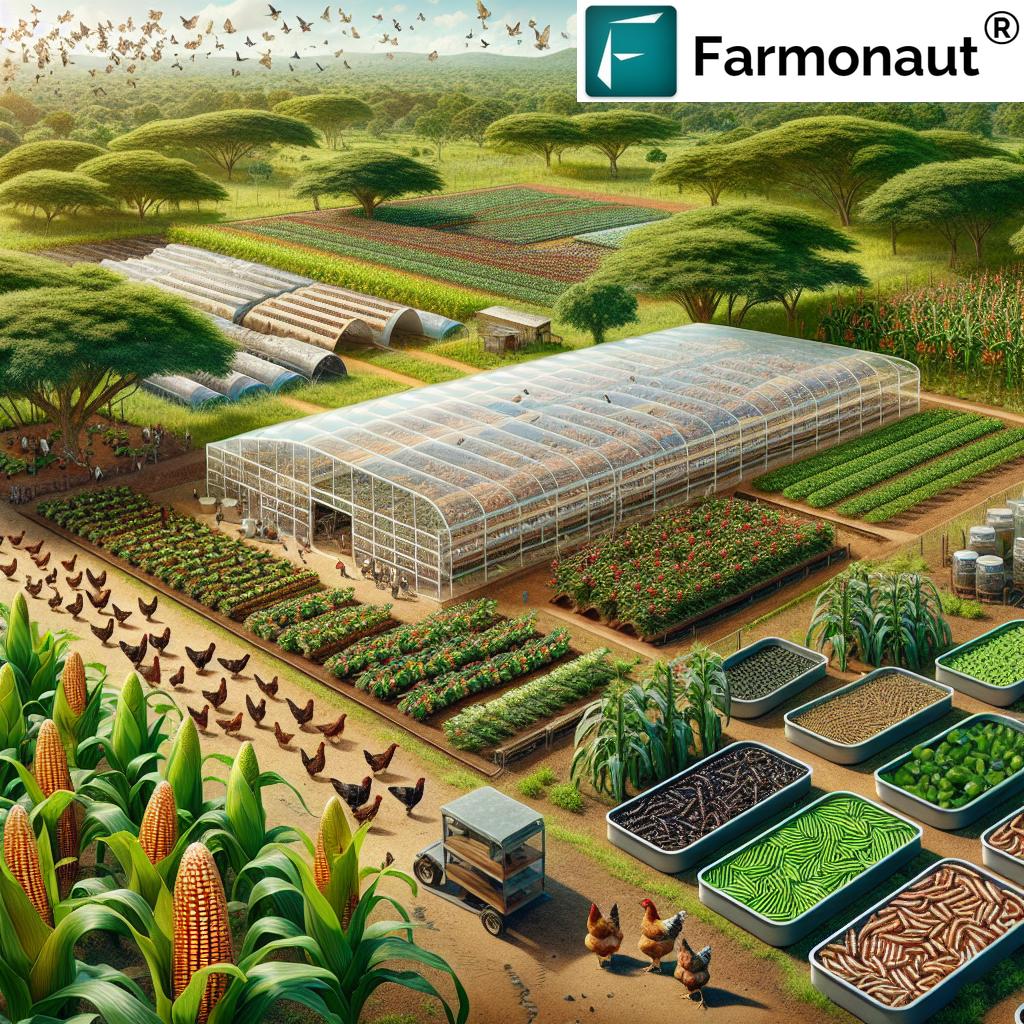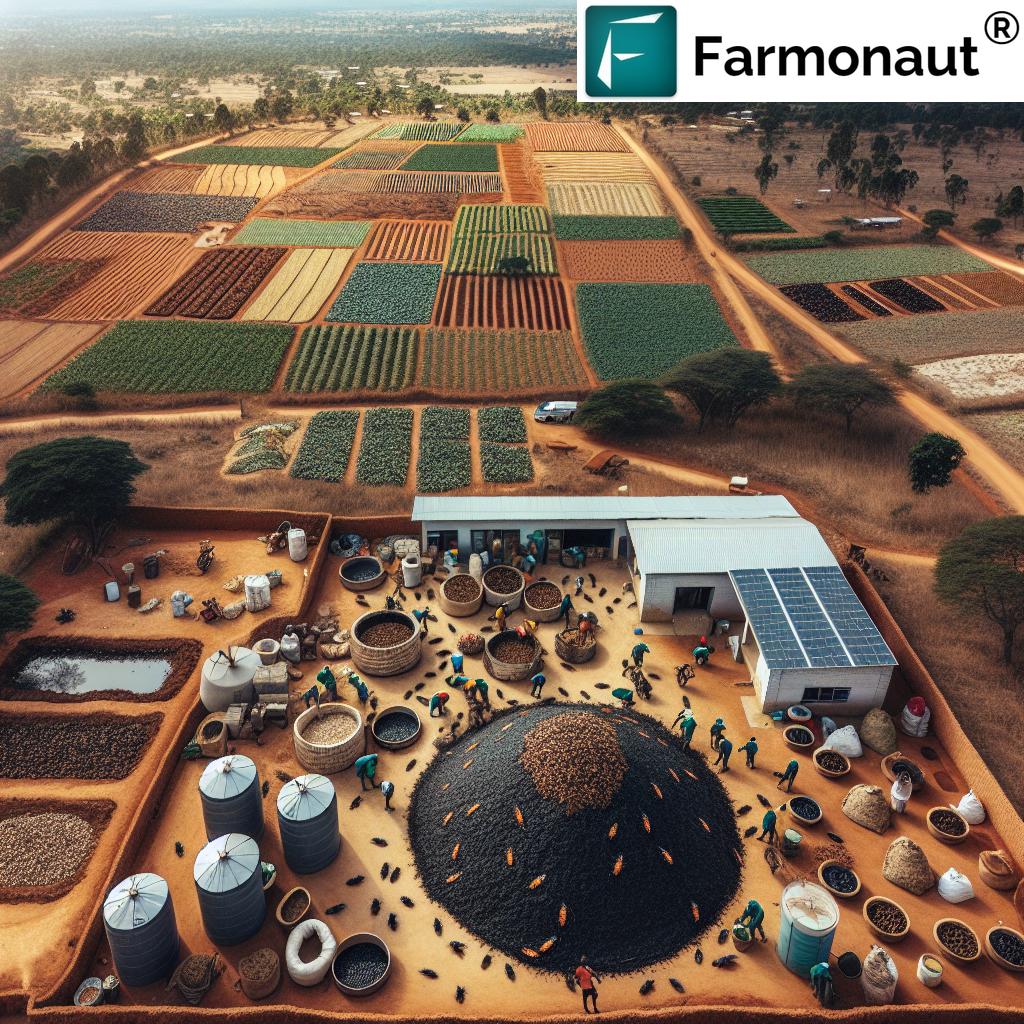Sustainable Agriculture in Zimbabwe: How Maggot Farming Is Transforming Food Security and Waste Management
“Black soldier fly larvae farming in Zimbabwe converts up to 80% of organic waste into high-protein animal feed.“
In the face of persistent droughts and economic challenges, Zimbabwe’s agricultural landscape is undergoing a remarkable transformation. We’re witnessing the dawn of a new era in sustainable agriculture practices that are revolutionizing food production and addressing critical issues of waste management. At the heart of this change is an unlikely hero: the humble maggot. Join us as we explore how maggot farming is reshaping Zimbabwe’s approach to food security and environmental sustainability.
The Rise of Maggot Farming in Zimbabwe
In southeastern Zimbabwe, a region historically plagued by extreme weather and poor sanitation, an innovative solution has emerged. Maggot farming, specifically the cultivation of black soldier fly larvae, is quickly gaining traction as a sustainable and cost-effective method for producing high-quality animal feed. This unconventional approach is not just transforming the lives of individual farmers; it’s catalyzing a broader shift towards climate change adaptation in farming.

The journey towards acceptance of this practice has been challenging. Initially met with skepticism and fear, the concept of farming insects for food was foreign to many in the community. Residents associated flies with disease outbreaks, particularly cholera, rather than viewing them as a valuable resource. However, with education and firsthand experience of the benefits, perceptions are rapidly changing.
Black Soldier Fly: Nature’s Waste Converter
At the core of this agricultural revolution is the black soldier fly (Hermetia illucens). Unlike common house flies, black soldier flies do not transmit diseases, making them an ideal candidate for large-scale farming. These remarkable insects possess an extraordinary ability to convert organic waste into nutrient-rich biomass rapidly.
- Fast life cycle: Complete metamorphosis in just a few weeks
- Efficient converters: Can process a wide variety of organic waste
- High protein content: Larvae are an excellent source of protein for livestock
- Environmentally friendly: Reduce greenhouse gas emissions from decomposing waste
The process of maggot farming is relatively simple yet incredibly effective. Organic waste, including fruit and vegetable scraps, manure, and other biodegradable materials, is collected and placed in controlled environments. Black soldier flies lay their eggs in this waste, and within days, the larvae hatch and begin consuming the organic matter. As they grow, these larvae become a protein-rich food source for chickens, fish, and other livestock.
Economic Impact on Zimbabwe’s Farmers
“Maggot farming can reduce traditional poultry feed costs by up to 50% for Zimbabwean farmers, improving food security.“
The economic benefits of maggot farming for Zimbabwe’s rural communities are substantial. Traditional poultry production costs in the country have been prohibitively high, with feed expenses accounting for up to 80% of total production costs. This financial burden has made it difficult for many small-scale farmers to maintain profitable operations, especially in the face of recurring droughts and crop failures.
Maggot farming offers a game-changing solution. By producing their own high-quality, protein-rich feed, farmers can significantly reduce their dependence on expensive commercial feeds. This cost reduction, estimated at around 40-50%, is making poultry farming viable again for many rural households.
Environmental Benefits of Maggot Farming
Beyond its economic advantages, maggot farming presents a powerful solution to Zimbabwe’s waste management challenges. The country generates approximately 1.6 million tons of waste annually, much of which is organic and compostable. By diverting this waste into maggot farming operations, Zimbabwe can significantly reduce its greenhouse gas emissions and mitigate the environmental impact of landfills.
This approach to agricultural waste management aligns perfectly with global efforts to combat climate change. As we face increasing pressure to reduce food loss and waste, maggot farming emerges as a circular economy solution that turns a problem into an opportunity.
Overcoming Challenges and Changing Perceptions
The journey to widespread adoption of maggot farming in Zimbabwe has not been without its challenges. Initial acceptance rates were low, with only about 5% of farmers willing to try this unconventional method. However, through persistent education efforts and demonstrable results, that figure has risen to approximately 50%.
Key factors in changing perceptions include:
- Education campaigns led by government experts and USAID
- Community demonstrations showcasing the benefits of maggot farming
- Testimonials from early adopters who experienced significant cost savings
- Emphasis on the disease-free nature of black soldier flies
As more farmers embrace this climate-resilient agricultural technology, we’re seeing a ripple effect throughout rural communities. What began as a means of survival is evolving into a lucrative business model, with farmers selling excess larvae and compost to their neighbors.
Comparative Analysis: Traditional vs. Maggot Farming in Zimbabwe
| Criteria | Traditional Poultry Farming | Maggot Farming | Benefits of Maggot Farming |
|---|---|---|---|
| Estimated feed cost per kg | $0.50 – $0.70 | $0.25 – $0.35 | 50% cost reduction |
| Estimated protein content in feed | 20-25% | 40-45% | Higher protein content for better animal growth |
| Waste management efficiency | Low | High | Converts up to 80% of organic waste into feed |
| Greenhouse gas emissions | High | Low | Reduced methane from waste decomposition |
| Drought resilience | Low | High | Less dependent on water-intensive crop production |
| Economic impact on farmers | Moderate | High | Increased profitability and food security |
The Role of Technology in Sustainable Agriculture
As we embrace innovative solutions like maggot farming, it’s crucial to recognize the role of technology in advancing sustainable agriculture. Companies like Farmonaut are at the forefront of this agricultural revolution, offering cutting-edge solutions that complement and enhance sustainable farming practices.
Farmonaut’s satellite-based farm management solutions provide valuable insights for farmers, enabling them to make data-driven decisions about crop health, resource allocation, and sustainability measures. By integrating these technologies with innovative practices like maggot farming, Zimbabwe’s agricultural sector is positioning itself for a more resilient and sustainable future.
For those interested in leveraging technology for sustainable agriculture, Farmonaut offers a range of tools and services:
- API access for developers and businesses looking to integrate satellite and weather data into their systems
- API Developer Docs for comprehensive guidance on utilizing Farmonaut’s data services
- Mobile applications for on-the-go farm management:
The Future of Sustainable Agriculture in Zimbabwe
As Zimbabwe continues to grapple with the effects of climate change and economic challenges, the adoption of innovative farming practices like maggot farming represents a beacon of hope. This approach not only addresses immediate concerns of food security and waste management but also aligns with broader goals of sustainable development and environmental stewardship.
The success of maggot farming in Zimbabwe serves as a model for other African nations facing similar challenges. Countries like Uganda and Nigeria have already seen commercial successes with this practice, and there’s potential for widespread adoption across the continent.
Empowering Farmers Through Education and Support
The transition to sustainable agriculture practices requires more than just introducing new technologies; it demands a shift in mindset and a commitment to continuous learning. In Zimbabwe, government agencies, NGOs, and agricultural experts are playing a crucial role in educating farmers about the benefits of maggot farming and other innovative techniques.
Key initiatives include:
- Workshops and training sessions on maggot farming techniques
- Demonstration farms showcasing the integration of maggot farming with traditional agriculture
- Peer-to-peer learning networks where experienced farmers mentor newcomers
- Access to microfinance and support for farmers looking to invest in new sustainable practices
By empowering farmers with knowledge and resources, Zimbabwe is building a resilient agricultural sector capable of withstanding future challenges.
The Global Context: Sustainable Agriculture and Food Security
Zimbabwe’s embrace of maggot farming is part of a larger global movement towards sustainable agriculture and food security. As the world population continues to grow, and climate change threatens traditional farming methods, innovative solutions like this are becoming increasingly crucial.
The United Nations’ Sustainable Development Goals (SDGs) emphasize the need for sustainable food production systems and resilient agricultural practices. Maggot farming aligns perfectly with these goals, offering a way to produce high-quality protein while reducing environmental impact and improving livelihoods.

Challenges and Opportunities Ahead
While the progress in adopting maggot farming in Zimbabwe is encouraging, challenges remain. These include:
- Scaling up operations to meet growing demand
- Developing regulatory frameworks to ensure quality and safety standards
- Addressing cultural barriers and misconceptions about insect-based feed
- Integrating maggot farming with other sustainable agricultural practices
However, these challenges also present opportunities for innovation, job creation, and economic growth. As the sector develops, we can expect to see new technologies and business models emerge, further enhancing the efficiency and impact of maggot farming.
Conclusion: A Sustainable Future for Zimbabwe’s Agriculture
The story of maggot farming in Zimbabwe is more than just an agricultural success; it’s a testament to human ingenuity and resilience in the face of adversity. By turning waste into a valuable resource, farmers are not only improving their livelihoods but also contributing to a more sustainable and food-secure future for their country.
As we look ahead, the potential for maggot farming to transform agriculture in Zimbabwe and beyond is enormous. Combined with other innovative practices and supported by technologies like those offered by Farmonaut, this approach could play a significant role in addressing global challenges of food security, waste management, and climate change.
The journey towards sustainable agriculture is ongoing, but with continued innovation, education, and support, Zimbabwe is well on its way to building a resilient and prosperous agricultural sector that can serve as a model for the world.
Frequently Asked Questions (FAQ)
- What is maggot farming, and how does it work?
Maggot farming involves cultivating black soldier fly larvae on organic waste. The larvae consume the waste, converting it into high-protein biomass that can be used as animal feed. - Is maggot farming safe for livestock consumption?
Yes, black soldier fly larvae are safe and nutritious for livestock. They are rich in protein and do not transmit diseases like common house flies. - How does maggot farming contribute to waste management?
Maggot farming can process large quantities of organic waste, reducing the amount sent to landfills and decreasing greenhouse gas emissions from decomposing waste. - What are the economic benefits of maggot farming for Zimbabwean farmers?
Maggot farming can reduce feed costs by up to 50%, significantly improving the profitability of poultry and livestock farming. - How does maggot farming help with climate change adaptation?
As a drought-resistant practice that doesn’t rely on water-intensive crops, maggot farming offers a resilient alternative to traditional farming methods in the face of climate change.




















